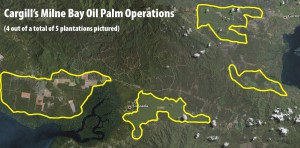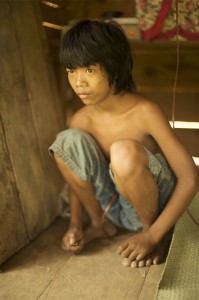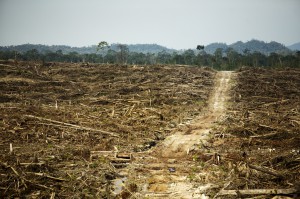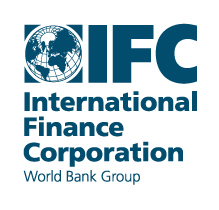With oil gushing in the gulf, activists locking down in boardrooms, the ball of financial reform being thrown from Wall Street to Washington and back again, and Indonesia announcing a two year freeze on the parceling out of its forests to international corporations, the world’s focus seems to be on corporations.
But in the struggle to hold onto the last of Indonesia’s rainforests – and the biodiversity, culture, livelihoods, and global climate stability these threatened forests provide – recent actions by the multilateral institutions International Finance Corporation (IFC), and the World Bank (WB) must not be ignored.
Multilateral institutions, funded by nations worldwide to implement projects, give loans, and steer ‘underperforming’ economies into globalized capitalism, are big, powerful, and active in Indonesia’s forests. The World Bank and its private investment arm, the IFC, have long seen agribusiness as a key growth sector in the tropics. In Indonesia and Papua New Guinea, both groups have given huge loans to encourage the expansion of palm oil and pulp wood plantations, to the benefit of multi-billion dollar corporations like Cargill and Wilmar.

Encouraged by the palm oil boom in Malaysia that created enormous wealth in that tropical country, the World Bank and IFC began giving out tens of millions of dollars to encourage the same process of industrialization in Indonesia’s forests.
But rather than work directly with Indonesia’s 30 million forest peoples and those that were concerned with the rational use of Indonesia’s natural resource wealth, the World Bank made the decision to fund some of the world’s largest agribusiness corporations, and trust that Wilmar and Cargill would act responsibly and with concern for the common good.
Today, after thirty years of World Bank and IFC’s support for the palm oil and pulp and paper industry, the social and environmental consequences of their trust in agribusiness is clear. The rich forests of Sumatra are now almost completely parceled out and in the control of corporations clear cutting the forest to produce forest commodities. The Orang Rimba, one of the world’s last truly nomadic cultures, are undergoing a mass exodus because their forest homes have been cleared for palm oil.

Newly cleared forests to make way for the planting of palm oil and pulp wood burn, releasing smoke plumes that travel for thousands of miles. In Papua New Guinea social unrest and upheaval created by the first industrial monoculture plantations is threatening to tear communities apart.
After thousands of media articles, exposes, research projects, and political appeals, The Forest Peoples Programme and Sawit Watch, supported by hundreds of additional environmental, social, and development groups, convinced the World Bank and IFC to freeze all of their projects supporting oil palm plantations. The process started with the Forest Peoples Programme and Sawit Watch filing a complaint with the IFC’s own internal auditing office over the destructive and dangerous practices of the palm oil producer Wilmar, which received a loan from the IFC for expansion.

The evidence of open burning and social conflict at Wilmar plantations was enough for the IFC to initiate a freeze on their support for oil palm while they carried out a review of their funding policies. Mounting evidence of the negative impacts of their oil palm plantation projects in Papua New Guinea combined with the IFC’s internal review to push the World Bank to declare their own moratorium on support for palm oil projects while they undergo their own review of the dangers of palm oil expansion.
The decision was one of the biggest wins to protect Indonesia’s forests in memory, as much for the implication on the ground for World Bank and IFC expansion projects as for the strong signal the moratorium send to private banks and agribusiness companies. The World Bank’s current moratorium serves as a warning to the private sector: the palm oil industry as a whole needs to be treated with great caution.
As the multilateral institutions proceed with consultations and internal reviews, and a final decision on palm oil funding is expected soon, almost two hundred leading Indonesian and International voices have called for the World Bank and IFC to implement significant reforms before the Bank returns to funding oil palm.
“Major reforms are needed in places like Sarawak and Indonesia to stop oil palm development doing further harm, including land tenure reforms, recognition of indigenous peoples’ rights, a halt to land-grabbing and a ban on clearance of forests and peatlands” says Marcus Colchester of the Forest Peoples Programme.
The thirty years of damage from the World Bank and the IFC’s support of the oil palm and pulp and paper sectors can not be undone, but immediately implementing needed reforms throughout the entire World Bank Group will be a positive step for Indonesia’s forests, forest peoples, and the climate.
**This blog post previously mis-characterized the nature and details of the demands put forward by Forest Peoples Program, Sawit Watch, and their allies. These groups have never called for a permanent moratorium on World Bank funding of palm oil projects; this mis-characterization of their position was the authors mistake. The text of the blog post has been changed to more accurately reflect these groups demands.**
Below is the list of environmental and social groups that have submitted and endorsed a statement urging the IFC and World Bank to freeze the funding of oil palm:
Submitted by:
Forest Peoples Programme
Sawit Watch
Lembaga Gemawan
Scale Up
Lestari Negri, Provinsi Riau
Serikat Tani Serumpun Damai (STSD), Kabupaten Sambas, Kalimantan Barat
SAD Kelompok 113 Sungai Bahar, Kabupaten Batanghari, Provinsi Jambi
DebtWatch Indonesia
Serikat Petani Kelapa Sawit (SPKS)
Jaringan Kerja Pemetaan Partisipatif (JKPP)
ELAW Indonesia
Setara, Jambi
Yayasan PADI Indonesia, Provinsi Kalimantan Timur
Supported by:
1. Nordin, Save Our Borneo, Provinsi Kalimantan Tengah
2. Rivanni Noor, CAPPA
3. Hendi Blasius Candra, WALHI Kalimantan Barat
4. Andi Kiki, Individu
5. Korinna Horta, Ph.D., Urgewald, Germany
6. Nasahar, Dewan AMAN NTB
7. Jelson Garcia, Asia Program Manager, Bank Information Center
8. Erwin Usman, WALHI Eksekutif Nasional/Ketua Badan Pengurus Nasional Koalisi Anti Utang-KAU)
9. Victor Mambor, Koordinator PJIK Foker LSM Papua
10. Dadang Sudardja, Aliansi Rakyat Untuk Citarum – ARUM
11. Rebecca Tarbotton, Executive Director (Acting), Rainforest Action Network
12. M. Zulficar Mochtar, Destructive Fishing Watch (DFW) Indonesia
13. Virginia Ifeadiro, Nigeria
14. Titi Soentoro, Manila
15. Hisma Kahman, Individu
16. Kamardi, Direktorat Perluasan Partisipasi Politik Masyarakat Adat, AMAN
17. Natalie Bridgeman, Accountability Counsel, USA
18. Dedi Ratih, WALHI Eksekutif Nasional
19. Khalid Saifullah, Direktur Eksekutif WALHI Sumatra Barat
20. Among, KRuHA
21. Bustar Maitar, Forest Campaign, Team Leader, GREENPEACE South-east Asia
22. Tri Wibowo, individu
23. Anuradha Mittal, the Oakland Institute, Oakland, CA, USA
24. Molly Clinehens, International Accountability Project
25. Yon Thayrun, Executive Editor, Voice of Human Right Media
26. Kristen Genovese, Senior Attorney, Center for International Environmental Law
27. Edy Subahani, POKKER SHK, Kalimantan Tengah
28. Nasution Camang, Yayasan Merah Putih (YMP) Sulawesi Tengah
29. Ibrahim A. Hafid, Institut Transformasi Lokal (INSTAL)
30. Rizal Mahfud, Individu
31. Sirajuddin, Ketua BPH AMAN Sulawesi Selatan
32. Mahir Takaka, Wakil Sekretaris Jendral, AMAN
33. Haitami, Pengurus AMAN Bengkulu
34. Suryati Simanjuntak, KSPPM Parapat, Sumatra Utara
35. Arifin Saleh, Pengurus AMAN
36. Shaban Stiawan, Individu, Kalimantan Barat
37. Fien Jarangga, Individu, Papua
38. Frida Klasin, Individu, Papua
39. Anike Th Sabami, Individu, Papua
40. Bernadetha Mahuse, Individu, Papua
41. Bata Manurun, BPH Wilayah AMAN Tana Luwu
42. Irsyadul Halim, Kaliptra Sumatera, Riau
43. Don K. Marut, Direktur Eksekutif INFID
44. Arie Rompas, Walhi Kalimantan Tengah
45. Ahmad SJA, PADI Indonesia, Balikpapan, Kalimantan Timur
46. Thomas Wanly, Sampit, Kalimantan Tengah
47. Datuk Usman Gumanti, Ketua BPH AMAN Wilayah Jambi
48. Itan, Mitra Lingkungan Hidup Kalimantan Tengah
49. Chabibullah, Serikat Tani Merdeka (SeTAM)
50. Asmuni, Sekretaris Jendral, SPKS Paser, Kalimantan Timur
51. Jazuri, Sekretaris Jendral, SPKS Tanjabar
52. Lamhot Sihotang, Sekretaris Jenrdal, SPKS Rokan Hulu Riau
53. Zuki, Sekretaris Jendral, SPKS Kabupaten Sekadau
54. Riko Kurniawan, Perkumpulan Elang Riau
55. Rano Rahman, Yayasan Betang Borneo, Kalimantan Tengah
56. Risma Umar, Solidaritas Perempuan (SP), Jakarta
57. Abdi Hayat, PERKUMPULAN SERABUT (SEKOLAH RAKYAT BUTUNI)
58. Mohammad Djauhari, Koordinator KpSHK, Bogor
59. Diana Gultom, Debtwatch Indonesia
60. Suzanne Jasper, First Peoples Human Rights Coalition, United States of America.
61. Jaya Nofyandry, Yayasan Lembaga Bantuan Hukum Lingkungan, Jambi
62. Jason Pan, TARA-Ping Pu, Taiwan
63. Thaifa Herizal, ST, Direktur Eksekutif, Atjeh Int’l Development
64. Hegar Wahyu Hidayat, Eksekutif Daerah WALHI Kalimantan Selatan
65. Fabby Tumiwa, Institute for Essential Services Reform (IeSR)
66. Puspa Dewy, Solidaritas Perempuan
67. Giorgio Budi Indrarto, Koordinator, Indonesia Civil Society Forum on Climate Justice
68. The Environment and Conservation Organisations of Aotearoa/NZ
69. Puspa Dewy, Solidaritas Perempuan
70. Leonardus Bagus, lPPSLH purwokerto
71. Chandra, WALHI Riau
72. Heny Soelistyowati, Program Manager – Komunitas Indonesia untuk Demokrasi
73. Agung Wardana, Nottingham
74. Haryanto, Belitung
75. M. Ali Akbar, Eknas WALHI
76. Mardiyah Chamim, Tempo Institute
77. Tandiono Bawor Purbaya, PHR Perkumpulan Huma
78. Arif Munandar, WALHI Jambi
79. Wirendro Sumargo, Forest Watch Indonesia
80. TM Zulfikar, individu
81. Hariansyah Usman, Direktur Eksekutif WALHI Riau
82. Ida Zubaidah, Direktur, Wahana peduli Perempuan Jambi/WPPJ
83. Ismet Soelaiman, Direktur, WALHI MALUT
84. Koesnadi Wirasapoetra, Sekretaris Jendral, Sarekat Hijau Indonesia
85. Teddy Hardiyansyah, Kabut Riau
86. Edo Rakhman, Direktur WALHI Sulawesi Utara
87. Asman Saelan, LBH Buton Raya
88. Wilianita Selviana, Direktur WALHI Sulawesi Tengah
89. R. Yando Zakaria, Lingkar Pembaruan Desa dan Agraria./KARSA, Yogyakarta
90. Adrian Banie Lasimbang, President, Jaringan Orang Asal SeMalaysia (JOAS)/ Indigenous Peoples’ Network of Malaysia
91. Ramananda Wangkheirakpam, North East Peoples Alliance, North East India
92. Joan Carling, Asia Indigenous Peoples Pact, Thailand
93. Sandra Moniaga, Jakarta, Indonesia
94. Muliadi SE, Diretktur PETAK DANUM Kalimantan Tengah
95. Idham Arsyad, Konsorsium Pembaruan Agraria (KPA)
96. Mukri Friatna, Eksekutif Nasional WALHI
97. Sanday Gauntlett, PIPEC (Pacific Indigenous Peoples Environment Coalition)
98. Rizki Anggriana Arimbi, Deputi WALHI Sulawesi Selatan
99. Javier M. Claparols, Director, Ecological Society of the Philippines
100. Agustinus Agus, LBBT, Pontianak
101. Endah Karyani, individu
102. Happy Hendrawan, Komunitas Transformatif Kalimantan Barat
103. Maharani Caroline, Direktur, YLBHI – LBH Manado
104. Budi Karyawan, AMAN-NTB
105. Taufiqul Mujib, Indonesian Human Rights Committee for Social Justice (IHCS)
106. Giring, Perkumpulan Pancur Kasih, Pontianak, Kalimantan Barat
107. Hironimus Pala, Yayasan Tananua Flores Ende NTT
108. Philipus Kami, JAGAT, NTT
109. Nikolaus Rima, AMATT Ende, NTT
110. Agus Sarwono,TiLe, Individu
111. Dickson Aritonang, Yayasan Ulayat Bengkulu
112. Mina Susana Setra, Aliansi Masyarakat Adat Nusantara (AMAN)
113. Alma Adventa, PhD, University of Manchester, UK
114. Marianne Klute, Watch Indonesia!, Jerman
115. Aidil Fitri, Yayasan Wahana Bumi Hijau – Sumatera Selatan, Indonesia
116. Anja Lillegraven, Rainforest Foundation Norway (RFN)
117. Judith Mayer, Ph.D., Coordinator, The Borneo Project, Earth Island Institute
118. Septer Manufandu, Forum Kerjasama LSM di Tanah Papua
119. Andik Hardiyanto, The Indonesian Social and Economic Rights Action Network
120. Hartono, WALHI Sulawesi Utara
121. Stephanie Fried, `Ulu Foundation
122. Sarah Lery Mboik, Individu (Anggota DPD RI Daerah Pemilihan NTT)
123. Julia Kam, Pontianak-Indonesia
124. Jupran Abbasri, Ketua Lembage Jurai Tue-Semende
125. Agapitus, AMAN Kalimantan Barat
126. Sainal Abidin, Perkumpulan WALLACEA Palopo
127. Macx Binur, Belantara Papua-Sorong
128. Sri Hartini, Walhi Kalimantan Barat
129. Ecologistas en Acción (Spain)
130. Muhammad Juaini, GEMA ALAM NTB
131. Budi Arianto, Banda Aceh, Indonesia
132. Solihin, Individu
133. Aylian Shiau, Kahabu Culture and Education Association of Nantou County
134. Sultan Darampa, Sulawesi Channel
135. Thomas Irawan Sihombing, Perkumpulan KABAN, KalBar
136. Yohanes RJ, Sintang, Kalbar Indonesia
137. Ranto Sibarani, Sekretaris Eksekutif, KOTIB
138. Nikmah, INFID
139. Ahmad, Deputy Director, ED. Walhi Sulteng
140. Sarma Hutajulu, Koordinator, Jaringan Aktifis Perempuan/Pendukung Penguatan Pr Sumut
141. Hamsuri, Individu, Balikpapan, Indonesia
142. Imanche Al Rachman, Koordinator Eksekutif Komnasdesa-Sultra
143. Asep Yunan Firdaus, HuMa
144. Juliade, Individu, Banjarmasin, Kalimantan Selatan
145. Arief Candra S Hut, Kelompok Studi Konservasi (KSK) HIMBA
146. Chia Tek-khiam, Director, Takao Indigenous Kakatao Council, Taiwan
147. Serge Marti – LifeMosaic
148. Betty Tiominar, Bogor
149. Rukmini Paata Toheke, AMAN
150. Carolyn Marr, UK Coordinator, Down to Earth
151. Yuni Riawati, Ketua BEK SP Komunitas Mataram
152. Geert Ritsema, Coordinator International Affairs, Friends of the Earth Netherlands
153. Gindo Nadapdap, Kelompok Pelita Sejahtera (KPS) Medan, Sumatra Utara
154. Eko Waskito, Lembaga Tiga Beradik Merangin, Jambi Sumatera Indonesia
155. Haryanto Ramli, Tanjungpandan – Belitung, Provinsi Kep. Bangka Belitung
156. Benget Silitonga, Sekretaris Eksekutif Perhimpunan BAKUMSU
157. Yuyun Kurniawan, Yayasan Titian
158. M. Rafli Kaitora, Ketua PD.AMAN Enggano
159. Ronny Christianto, Sahabat Masyarakat Pantai (SAMPAN), Kalimantan Barat
